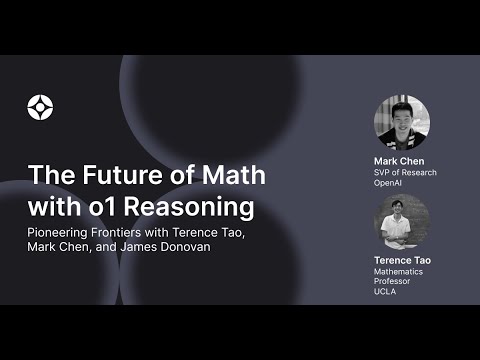The video features a discussion with mathematician Terence Tao and OpenAI researchers Mark Chen and James Donovan about the transformative potential of AI in mathematics, emphasizing collaborative problem-solving and the need for a cultural shift towards teamwork in the field. They explore the implications of AI on mathematical education and research, highlighting the importance of maintaining foundational skills while leveraging AI as a co-worker to enhance human capabilities.
The video features a discussion on the future of mathematics with renowned mathematician Terence Tao, along with OpenAI researchers Mark Chen and James Donovan. The conversation begins with an introduction by Natalie, who emphasizes OpenAI’s mission to ensure that artificial general intelligence benefits all of humanity. The speakers delve into the current state of mathematics and the potential for AI to revolutionize the field by enabling collaborative problem-solving on a larger scale than ever before. Tao expresses excitement about the possibility of reworking mathematics from the ground up, leveraging AI tools to tackle multiple problems simultaneously rather than focusing on one at a time.
Tao and Chen discuss the limitations of current AI models, particularly in their reasoning capabilities. While models like GPT-4 have shown impressive knowledge, they still struggle with deep reasoning and often rely on prior knowledge. The conversation shifts to the development of the O Series of models, which aim to enhance reasoning by encouraging a more reflective approach to problem-solving. Both speakers highlight the importance of data efficiency and creating intuitive user experiences, acknowledging that while AI can assist in mathematical tasks, human oversight remains crucial.
The discussion also touches on the evolving roles of mathematicians in light of AI advancements. Tao suggests that the traditional model of individual mathematicians tackling complex problems may shift towards a more collaborative approach, where tasks can be divided among specialists, including AI. This modular approach could democratize mathematics, allowing individuals with varying skill sets to contribute to larger projects. Tao emphasizes the need for a cultural shift in mathematics, where collaboration and the use of AI tools become integral to the research process.
As the conversation progresses, the speakers explore the implications of AI on mathematical education and research. They discuss the potential for AI to enhance learning experiences by allowing students to engage with models that can critique their work or generate synthetic problems for practice. However, they also caution against over-reliance on AI, stressing the importance of developing foundational skills in mathematics. The speakers envision a future where AI serves as a co-worker, augmenting human capabilities rather than replacing them.
In conclusion, the video highlights the transformative potential of AI in mathematics and related fields. Tao and Chen express optimism about the future, envisioning a landscape where AI facilitates greater collaboration, accelerates research, and enhances educational experiences. They acknowledge the challenges ahead, including the need for robust verification methods and the establishment of new norms around authorship and collaboration in mathematical research. The discussion underscores the importance of adaptability and openness to change as the mathematical community navigates this evolving landscape.
